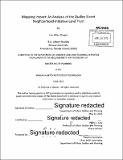Mapping impact : an analysis of the Dudley Street Neighborhood Initiative Land Trust
Author(s)
Dwyer, Lee Allen
DownloadFull printable version (13.59Mb)
Other Contributors
Massachusetts Institute of Technology. Department of Urban Studies and Planning.
Advisor
Phillip L. Clay.
Terms of use
Metadata
Show full item recordAbstract
This thesis examines the Dudley Street Neighborhood Initiative (DSNI) community land trust, which provides long-term affordable housing to low-income families using a resale-restricted model and promotes community control over development. It seeks to answer the following question: how much and in what ways has DSNI's land trust stabilized the Dudley neighborhood, specifically with regard to foreclosures, vacant lots, owner occupancy, and housing affordability? It also attempts to measure the land trust's impact spatially and quantitatively and isolate it from economic and social changes in the surrounding neighborhood and the broader Boston housing market. Interviews with housing researchers and experts on the Dudley area supplements this quantitative analysis (a relatively rare approach to studying community land trusts). Findings largely support the hypothesis that the DSNI land trust has significantly lower building values and vacancy rates than the surrounding neighborhood, as well as significantly fewer foreclosures during the housing crisis and an increasing owner-occupancy rate. It is not clear whether there is a spillover effect from the land trust onto neighboring properties within the Dudley Triangle; however, the analysis does largely support the land trust's claims as a model for housing affordability and development without displacement. The conclusion offers implications for DSNI, the community land trust model, and Boston housing policy.
Description
Thesis: M.C.P., Massachusetts Institute of Technology, Department of Urban Studies and Planning, 2015. This electronic version was submitted by the student author. The certified thesis is available in the Institute Archives and Special Collections. Cataloged from student-submitted PDF version of thesis. Includes bibliographical references (pages 101-110).
Date issued
2015Department
Massachusetts Institute of Technology. Department of Urban Studies and PlanningPublisher
Massachusetts Institute of Technology
Keywords
Urban Studies and Planning.